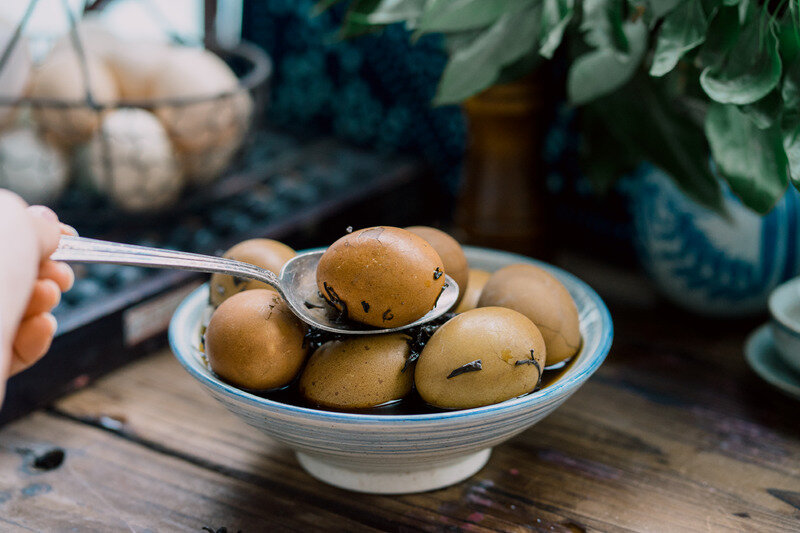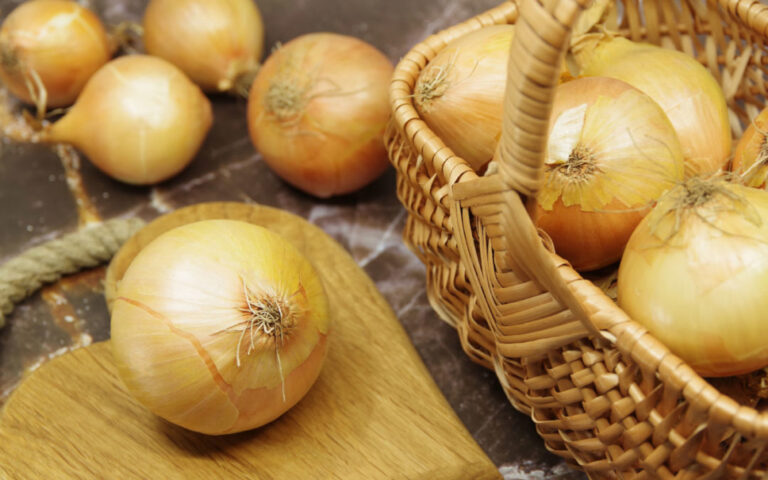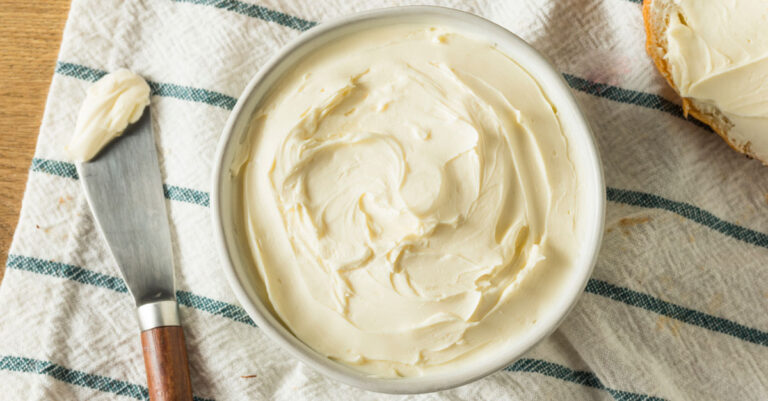Boiled Egg with Tea Benefits! A Powerful Duo for Your Health
Boiled eggs with tea offer a range of health benefits. The combination is an excellent source of essential nutrients and antioxidants. Eggs provide high-quality protein, vitamins, and minerals, promoting feelings of fullness and supporting weight management. Tea, rich in antioxidants, aids in improving heart health and cognitive function.
The catechins in tea can lower cholesterol levels, while choline in eggs contributes to better brain health. Additionally, studies confirm the advantages of this pairing. It’s important to incorporate them into a balanced diet, as they are low in calories and can be part of a healthy lifestyle. Whether enjoyed together or separately, boiled eggs and tea can be a tasty and nutritious addition to your daily routine.
Are Tea Eggs Healthy?
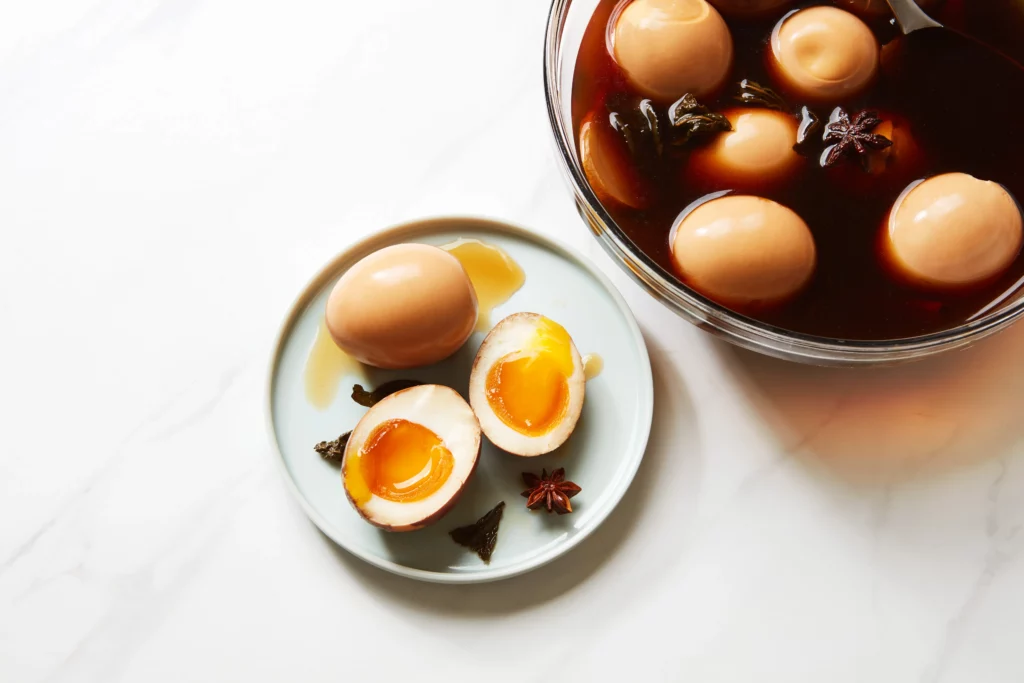
Yes, tea eggs can be a healthy snack or addition to your diet, depending on how they are prepared and consumed. Tea eggs are a traditional Chinese dish where boiled eggs are steeped in a flavorful mixture of tea, soy sauce, and various spices, giving them a marbled appearance and a unique taste. Here are some factors to consider regarding the healthiness of tea eggs
Protein: Eggs are a good source of high-quality protein, which is essential for building and repairing tissues, as well as supporting overall muscle health.
A single large egg provides around 6 grams of protein, making up about 12% of the daily protein recommendation for adults.
Low in Calories: Boiled eggs, in general, are relatively low in calories, making them a suitable option for those looking to manage their weight.
Nutrient-Rich: Eggs are packed with essential nutrients, including vitamins (B12, B6, D) and minerals (iron, zinc), as well as antioxidants like lutein and zeaxanthin, which benefit eye health.
Spices and Flavorings: The spices and flavorings used in the tea egg recipe can vary. Some ingredients, like star anise, cinnamon, and black tea, may have health benefits, such as antioxidant properties. However, be cautious of excessive salt or sodium content if the soy sauce is heavily used.
Satiety: The combination of protein and flavorings can make tea eggs a satisfying and filling snack, reducing the temptation to indulge in less healthy options.
Variability: The healthiness of tea eggs can vary greatly based on the specific recipe and preparation method. For a healthier option, consider using a lower-sodium soy sauce or reducing the amount of soy sauce in the recipe.
While tea eggs can be a part of a balanced and healthy diet, it’s important to consume them in moderation. If you have dietary restrictions or health concerns, you may want to adjust the ingredients and seasonings to suit your specific needs. Overall, when prepared thoughtfully, tea eggs can be a nutritious and tasty addition to your culinary repertoire.
How are Tea Eggs Beneficial for Weight Loss?
Weight loss is a common health goal for many individuals, and achieving it often requires a combination of a balanced diet and regular physical activity. Tea eggs, although not a miracle weight loss solution, can play a supportive role in your journey to shed those extra pounds.
Satiety and Appetite Control
The protein in eggs is known for its satiating effect. When you consume protein-rich foods like tea eggs, it triggers the release of hormones that signal fullness to your brain. This can help you eat less overall, as you’re less likely to experience hunger shortly after your meal. In turn, reduced calorie intake can support weight loss.
Balanced Nutrition
Tea eggs offer a mix of nutrients. Apart from protein, eggs contain essential vitamins and minerals, including B vitamins (like B12 and riboflavin), selenium, and phosphorus. These nutrients are essential for various metabolic processes, ensuring your body operates efficiently. When you receive the necessary nutrients, you’re less likely to crave additional, less healthy foods.
Low-Calorie Snacking
Compared to many processed snacks and fast food options, tea eggs are relatively low in calories. A typical tea egg is estimated to have around 70-90 calories. This makes them an attractive option for those looking to manage their calorie intake while still enjoying flavorful and satisfying snacks.
Metabolism Boost
Eggs contain choline, which is a vital nutrient involved in fat metabolism. Proper fat metabolism is important for weight loss and maintaining a healthy body composition. When your body metabolizes fat efficiently, it can help you shed excess body fat.
Avoiding Unhealthy Snacks
Tea eggs can serve as a healthy alternative to less nutritious snacks. When you have a flavorful, nutrient-dense option like tea eggs on hand, you’re less likely to reach for high-calorie, low-nutrient snacks that can sabotage your weight loss efforts.
Tea’s Role
The tea used in tea eggs can be rich in antioxidants, particularly catechins. These antioxidants may help boost metabolism, increase fat oxidation, and reduce body fat. Green tea, in particular, is associated with these weight loss benefits.
How to Lose Weight When Eating Tea Eggs?
Losing weight while enjoying tea eggs can be part of a balanced approach to diet and lifestyle. Here are some practical steps to help you achieve your weight loss goals when incorporating tea eggs into your diet
Portion Control: Keep track of the number of tea eggs you consume. While they’re nutritious, overeating can lead to excess calorie intake. Stick to a reasonable portion size, usually one or two eggs per serving.
Balanced Diet: Tea eggs should be a part of a balanced meal plan. Include plenty of fruits, vegetables, whole grains, and lean protein sources in your diet. This ensures you get a wide range of nutrients while managing your overall calorie intake.
Regular Physical Activity: Combine a healthy diet with regular exercise. Physical activity can help you burn calories, build muscle, and improve your overall fitness. Aim for a mix of cardio and strength-training exercises.
Hydration: Stay well-hydrated by drinking plenty of water. Sometimes, our bodies confuse thirst with hunger, leading to unnecessary snacking. Water can help control this.
Mindful Eating: Pay attention to what you eat. Eat slowly, savor the flavors, and listen to your body’s hunger cues. Mindful eating can prevent overeating.
Reduce Sugary and High-Fat Additions: If you prepare tea eggs at home, be mindful of the ingredients you use. Some recipes include sugar and fatty sauces, which can add unnecessary calories. Opt for low-sodium soy sauce or use it in moderation.
Regular Meals and Snacks: Don’t skip meals. Skipping meals often leads to overeating later. Instead, have balanced, regular meals and use tea eggs as a satisfying and healthy snack when needed.
Check Ingredients: If you’re buying tea eggs from a store or a vendor, check the ingredients. Some commercial versions may contain additives that you want to avoid.
Consult a Professional: If you have specific weight loss goals or dietary concerns, consider consulting with a registered dietitian or healthcare professional. They can provide personalized guidance tailored to your needs.
Consistency: Weight loss is a gradual process. Be patient and consistent with your efforts. Set realistic goals, and focus on long-term health rather than quick fixes.
What Are the Nutritional Benefits of Boiled Eggs with Tea?
The nutritional value of boiled egg with tea can vary depending on factors like the size of the egg, the type of tea, and any additional ingredients used in the preparation of the tea. However, here’s a general overview of the key nutrients you can expect from this combination
Boiled Egg (Large, about 50 grams)
- Calories: Approximately 70-80 calories
- Protein: About 6 grams
- Fat: Around 5 grams, mainly healthy unsaturated fats
- Vitamins: Significant sources of vitamin B12, riboflavin (B2), and choline
- Minerals: Rich in selenium and phosphorus
Tea (1 cup, brewed, without sugar or milk)
- Calories: Virtually zero, as long as no sweeteners or milk are added
- Antioxidants: Abundant in various types of tea (e.g., green, black, herbal) such as catechins, flavonoids, and polyphenols
- Compounds: Depending on the type, tea may contain the amino acid L-theanine, which can have a calming effect.
The nutritional value of the combination mainly depends on how you prepare and consume them. If you add sugar, cream, or other high-calorie ingredients to your tea, it can significantly increase the calorie content. Similarly, the way you cook the egg (boiling with or without salt) can alter its nutritional profile slightly.
When you consume boiled egg with tea, you benefit from a combination of protein, healthy fats, antioxidants, vitamins, and minerals. This can make for a balanced and nutritious snack or light meal, provided that it fits within your overall dietary goals and preferences.
How to Make Tea Eggs?
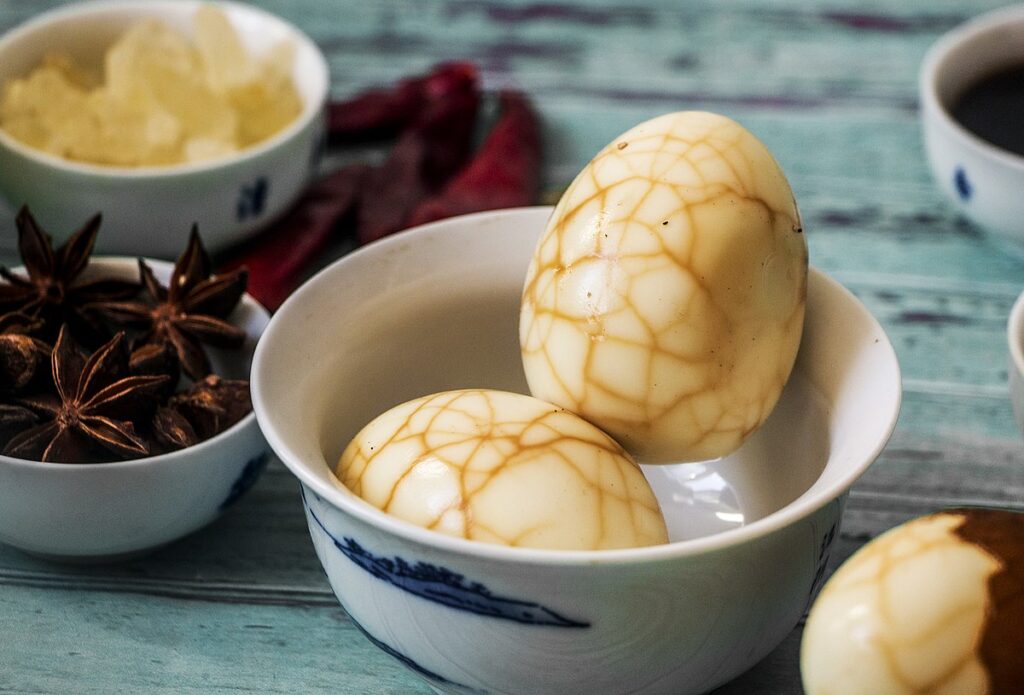
Tea eggs are a delightful and flavorful snack, originating from China. They are hard-boiled eggs infused with a fragrant and savory mixture of tea, spices, and soy sauce.
Ingredients
- 6-8 eggs
- 2 tablespoons of black tea leaves (or 2 tea bags)
- 1/4 cup of soy sauce
- 1 cinnamon stick
- 2-3 star anise pods
- 2-3 cloves
- 1 teaspoon of salt
- 1 teaspoon of sugar (optional)
- Water (enough to cover the eggs)
Boil the Eggs
- Place the eggs in a saucepan and add enough water to cover them.
- Bring the water to a boil over medium-high heat.
- Once the water is boiling, reduce the heat to low and let the eggs simmer for 9-12 minutes. The longer you cook them, the firmer the yolk will become. Adjust the cooking time to your preference.
Cool and Crack the Eggs
- After boiling, remove the eggs from the saucepan and place them in a bowl of cold water. Allow them to cool for a few minutes.
- Gently tap the eggs all over with the back of a spoon to create cracks in the eggshell. The more cracks, the more flavor will infuse into the egg.
Prepare the Tea and Spice Mixture
- In a separate pot, add the tea leaves or tea bags, soy sauce, cinnamon stick, star anise pods, cloves, salt, and sugar (if using).
- Pour in enough water to cover the mixture and bring it to a boil. Allow it to simmer for a few minutes to let the flavors meld.
Marinate the Eggs
- Place the cracked eggs into the simmering tea and spice mixture. Make sure the eggs are fully submerged.
Simmer and Infuse
- Cover the pot and let the eggs simmer in the tea mixture for at least 2 hours. For more intense flavor, you can leave them to marinate for up to 12 hours or even overnight.
Peel and Enjoy
- Once the eggs have marinated to your liking, remove them from the pot.
- Gently peel the eggs to reveal their beautiful marbled appearance. The cracks in the shell allow the flavors to permeate the egg whites.
Serve
- Tea eggs can be served warm or at room temperature. They make a fantastic snack or appetizer.
These flavorful tea eggs are not only delicious but also visually appealing, making them a perfect addition to your culinary repertoire. You can adjust the recipe to your taste by experimenting with the marinating time and the intensity of flavors. Enjoy your homemade tea eggs!
FAQ
Can we drink tea after eating omlet?
Yes, you can drink tea after eating an omelette. It’s a common combination and shouldn’t cause any issues.
Can I eat egg and milk together?
Yes, you can eat eggs and milk together. They are often combined in recipes like scrambled eggs or custards.
What should not be eaten with egg?
Eggs typically go well with most foods. However, individual dietary restrictions and allergies should be considered.
Is it OK to drink milk after eating omelette?
Yes, it’s okay to drink milk after eating an omelette. The order in which you consume them usually doesn’t affect digestion.
How many eggs should I eat a day?
The number of eggs you can eat daily varies by individual health and dietary factors. In general, most people can safely consume up to one egg per day.
Can we eat omelette with coffee?
Yes, you can eat an omelette with coffee. It’s a common breakfast combination.
How long after breakfast can I drink milk?
You can drink milk at any point during or after breakfast, depending on your preference.
How much time gap between egg and milk?
There is no specific time gap required between eating eggs and drinking milk. You can consume them together or separately as you prefer.
What not to eat with milk?
Avoid consuming milk with foods high in tannins, like certain green leafy vegetables, as it can interfere with calcium absorption.
Is it OK to eat boiled egg with coffee?
Yes, it’s okay to eat a boiled egg with coffee. It’s a common and balanced breakfast choice.
Final words
On the whole, the pairing of boiled eggs with tea is a delightful way to boost your health while savoring a tasty snack. Boiled eggs provide a protein-packed punch and a variety of essential nutrients. Tea, with its antioxidants and calming properties, adds an extra layer of goodness to the mix.
Whether you’re watching your weight, aiming for a heart-healthy diet, or simply looking for a nutritious and satisfying treat, this combination has something to offer. So, don’t hesitate to include boiled eggs with your favorite cup of tea in your daily routine – it’s a simple yet effective choice for your overall well-being.

